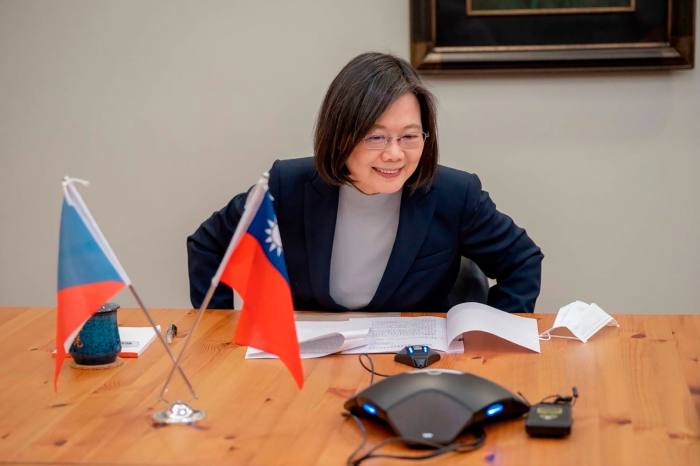The Czech president-elect has called on EU states to drop any illusions about China, saying his country would no longer “behave like an ostrich” over divergent interests with Beijing.
Petr Pavel’s warning comes days after the retired Nato commander swept to victory in Czech elections, comfortably beating his populist opponent with an Atlanticist, pro-European platform.
One of Pavel’s first moves has been to confront what he sees as dangerous misconceptions about China, which he argues were exposed by Beijing’s unwillingness to condemn Russia’s invasion of Ukraine.
“This is what we have to be very clear about: China and its regime is not a friendly country at this moment, it is not compatible with western democracies in their strategic goals and principles,” Pavel said in an interview with the Financial Times. “This is simply a fact that we have to recognise.”
Defying warnings over potential retaliation, Pavel on Monday became the first elected European head of state to speak to Taiwanese president Tsai Ing-wen. Pavel said the Czech Republic stands to benefit more from Taiwan than China economically and “we will not behave as an ostrich to hide this reality”.
After Pavel’s call with Tsai, China issued a scathing response on Tuesday and called for Prague to change tack to avoid “irreparable damage” in relations. Foreign ministry spokeswoman Mao Ning said Pavel “ignored China’s repeated attempts to dissuade him” and “persisted in stepping on China’s red line”.

Beijing, which demands other countries also treat Taiwan as if it were part of China, punished Lithuania for its pro-Taipei stance with targeted curbs on its exports. In December, the EU took China to the World Trade Organization over the spat with Lithuania.
But such hazards have not deterred Pavel from speaking his mind. “I’m aware of some . . . potential threats but at the same time I don’t really see any breach of principles for the relations between the Czech Republic and China,” he said.
The phone call was initiated by Taiwan, according to Pavel. But he stands ready to meet Tsai at some stage and wants stronger ties with Taiwan. “Taiwan is without any doubt a microchip superpower today,” he said. The Speaker of the lower house of the Czech parliament is set to visit Taipei in March and Pavel said that this trip should bring “some new ideas on how to expand our co-operation”.
As he explained his worldview, Pavel argued there was “definitely a lesson to be learned” from Beijing’s failure to rein in Moscow over its invasion of Ukraine. “Undoubtedly, China had a chance to have a strong voice in influencing Russian decisions [but] didn’t take that chance. They stayed away.”
When Pavel takes office in March, it will represent a wholesale change of approach from his predecessor Miloš Zeman, a political veteran who embraced Russia and lauded how China had “stabilised” its society. Zeman only turned his back on President Vladimir Putin following Russia’s all-out attack on Ukraine in February last year.
During his two terms in office, Zeman pushed for Prague to become “China’s gateway to Europe”, but most of the Chinese investments that Zeman promised failed to materialise.
Pavel also stands out as a political novice who made his career in the military, rising to the rank of general before serving as chair of Nato’s military committee between 2015 and 2018. In what was his first electoral campaign, he defeated billionaire Andrej Babiš, a former prime minister supported by Zeman, in a runoff vote last weekend.

Within the EU, Pavel said that he saw room to develop the Visegrad Four alliance between his country, Slovakia, Poland and Hungary, even as he voiced concerns over Viktor Orbán’s grip over Budapest.
He noted Orbán’s recent ousting of military officers, who were allegedly more aligned with Nato than the Hungarian leader’s own Russophile outlook. “What I saw in Hungary in recent years was a step-by-step concentration of power around Viktor Orbán and restrictions on all those who had a different view,” said Pavel. Removing officers “is a continuation”, he added.
Pavel forecast that the first German-made Leopard tanks could be delivered to Ukraine “in the weeks to come”, saying they would primarily come from Poland and other countries in the region.
He sees the tussle over tanks among Nato allies demonstrating how the politics of arming Ukraine could also shift when it comes to fighter jets.
“Months ago, no one [expected] that there would be broad agreement on sending tanks and now we have a commitment of more than 300,” he said. “So I wouldn’t be very strict in saying which areas will be forbidden and which will be open. It will depend on the situation on the battlefield.”
Additional reporting by Kathrin Hille in Taipei
"accept" - Google News
February 01, 2023 at 06:00PM
https://ift.tt/56hEaQ7
Czech president-elect says west must accept China is 'not friendly' - Financial Times
"accept" - Google News
https://ift.tt/I7ysRZX
https://ift.tt/sJP0NZO
Bagikan Berita Ini














0 Response to "Czech president-elect says west must accept China is 'not friendly' - Financial Times"
Post a Comment